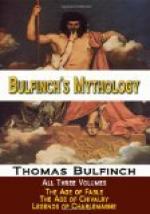The king showed much gratitude to Tristram, but in the bottom of his heart he cherished bitter jealousy of him. One day Tristram and Isoude were alone together in her private chamber. A base and cowardly knight of the court, named Andret, spied them through a keyhole. They sat at a table of chess, but were not attending to the game. Andret brought the king, having first raised his suspicions, and placed him so as to watch their motions. The king saw enough to confirm his suspicions, and he burst into the apartment with his sword drawn, and had nearly slain Tristram before he was put on his guard. But Tristram avoided the blow, drew his sword, and drove before him the cowardly monarch, chasing him through all the apartments of the palace, giving him frequent blows with the flat of his sword, while he cried in vain to his knights to save him. They were not inclined, or did not dare, to interpose in his behalf.
A proof of the great popularity of the tale of Sir Tristram is the fact that the Italian poets, Boiardo and Ariosto, have founded upon it the idea of the two enchanted fountains, which produced the opposite effects of love and hatred. Boiardo thus describes the fountain of hatred:
“Fair was that fountain, sculptured
all of gold,
With alabaster sculptured,
rich and rare;
And in its basin clear thou
might’st behold
The flowery marge reflected
fresh and fair.
Sage Merlin framed the font,—so
legends bear,—
When on fair Isoude doated
Tristram brave,
That the good errant knight,
arriving there,
Might quaff oblivion in the
enchanted wave,
And leave his luckless love, and ’scape
his timeless grave.
’But ne’er the warrior’s
evil fate allowed
His steps that fountain’s
charmed verge to gain.
Though restless, roving on
adventure proud,
He traversed oft the land
and oft the main.”
CHAPTER XIII
Tristram and Isoude (Continued)
After this affair Tristram was banished from the kingdom, and Isoude shut up in a tower, which stood on the bank of a river. Tristram could not resolve to depart without some further communication with his beloved; so he concealed himself in the forest, till at last he contrived to attract her attention, by means of twigs which he curiously peeled, and sent down the stream under her window. By this means many secret interviews were obtained. Tristram dwelt in the forest, sustaining himself by game, which the dog Houdain ran down for him; for this faithful animal was unequalled in the chase, and knew so well his master’s wish for concealment, that, in the pursuit of his game, he never barked. At length Tristram departed, but left Houdain with Isoude, as a remembrancer of him.




